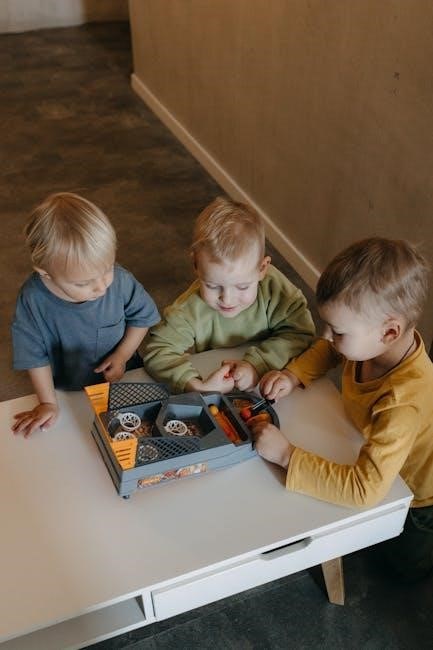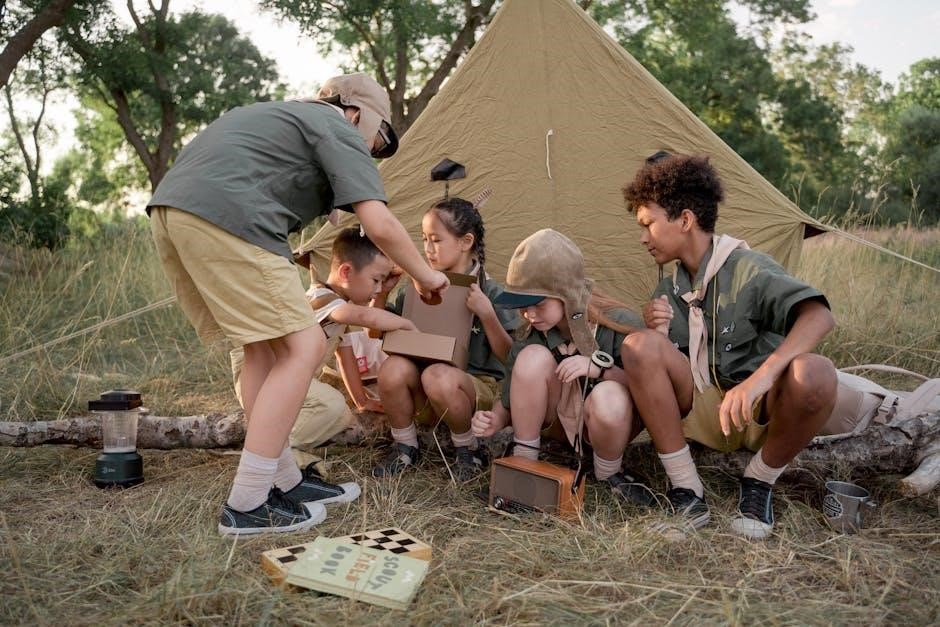Cognitive Development Activities
Engage 4-5 year olds with sorting games, memory matching, and problem-solving exercises. These activities enhance logical reasoning, categorization, and critical thinking skills through fun, interactive learning experiences.
1.1 Sorting and Classifying Games
Sorting and classifying games are excellent for developing cognitive skills in 4-5 year olds. Activities like sorting objects by color, shape, or size help improve logical reasoning and categorization abilities. For example, sorting buttons, toys, or animals into groups enhances problem-solving and critical thinking. Printable PDF worksheets with sorting exercises, such as matching objects by theme or attribute, are widely available online. These games also introduce basic math concepts and prepare children for more complex learning tasks while keeping them engaged and entertained.
1.2 Memory Games and Matching Activities
Memory games and matching activities are ideal for enhancing cognitive growth in 4-5 year olds. Simple games like matching pairs of cards or identifying identical objects improve memory and concentration. Printable PDF worksheets with matching exercises, such as pairing shapes or animals, are widely available. These activities help children develop attention to detail and logical thinking while fostering patience and persistence. Interactive matching games also promote problem-solving skills and provide a fun way to strengthen memory abilities, preparing children for more complex cognitive tasks.
Fine and Gross Motor Skills Development
Enhance motor skills with activities like using tweezers, tracing worksheets, and building with blocks; These exercises improve dexterity, hand-eye coordination, and overall physical control in young children.
2.1 Fine Motor Activities (e.g., Using Tweezers, Tracing Worksheets)
Fine motor activities, such as using tweezers to transfer small objects or tracing worksheets, are essential for developing hand-eye coordination and dexterity in 4-5 year olds. These exercises strengthen the pincer grasp and precision, preparing children for writing and other intricate tasks. Tracing worksheets, often available in free PDF formats, provide structured practice for mastering lines, curves, and shapes. Activities like sorting beads or stacking small blocks also enhance finger control and patience. Educational resources, such as printable tracing templates, offer engaging ways to refine these skills through repetition and creativity.
2.2 Gross Motor Activities (e.g., Building with Blocks, Dress-up Play)
Gross motor activities like building with blocks or engaging in dress-up play are crucial for developing physical strength, coordination, and balance in 4-5 year olds. These exercises encourage active play, fostering overall motor skills and creativity. Group games, such as running or jumping, also promote teamwork and social interaction. Dress-up play enhances imaginative thinking, while block-building strengthens problem-solving abilities and hand-eye coordination. These activities, often included in free PDF resources, provide a playful way to enhance physical and cognitive growth simultaneously.

Creative Expression and Art
Foster creativity in 4-5 year olds with coloring, drawing, and craft projects using everyday materials. These activities enhance fine motor skills, imagination, and self-expression, providing a fun outlet for artistic exploration and confidence building.
3.1 Coloring and Drawing Activities
Coloring and drawing activities are essential for fostering creativity and fine motor skills in 4-5 year olds. Provide them with crayons, markers, or colored pencils to explore different colors and techniques. Use themed worksheets, such as shape recognition or seasonal themes, to make learning fun. These activities enhance hand-eye coordination, creativity, and self-expression. Incorporate tracing exercises to improve dexterity and prepare for writing. Free printable PDF resources offer a variety of engaging templates, from simple shapes to complex patterns, helping children build confidence and artistic skills through playful exploration.
3.2 Craft Projects Using Everyday Materials
Craft projects using everyday materials foster creativity and resourcefulness in 4-5 year olds. Use items like paper, glue, scissors, and recycled materials to create engaging activities. For example, make collages from magazine cutouts or transform egg cartons into colorful creatures. Seasonal crafts, such as leaf rubbings or paper plate flowers, encourage exploration and fine motor skills. These projects not only promote creativity but also teach children to value and reuse materials. Easy-to-follow PDF guides offer step-by-step instructions, making it simple for parents and educators to facilitate these fun and educational activities at home or in the classroom.
Language and Literacy Skills
Enhance language and literacy skills with alphabet stencils, tracing worksheets, and interactive games. These activities help children recognize letters, sounds, and basic writing skills, fostering early reading abilities.
4.1 Alphabet and Word Recognition Games
Alphabet and word recognition games are essential for early literacy skills. Use alphabet stencils, letter tracing worksheets, and matching games to help children identify letters and sounds. Interactive activities like spelling simple words and connecting letters to sounds foster phonological awareness. Incorporate games that involve sorting letters by shape or sound, as well as exercises where children match uppercase and lowercase letters. These engaging tasks build foundational reading skills and prepare young learners for writing and reading independently. Free printable PDF worksheets and activity books provide structured resources for these exercises.
4.2 Storytelling and Simple Writing Exercises
Storytelling and simple writing exercises foster creativity and early literacy skills. Encourage children to express their thoughts through verbal storytelling and guided writing prompts. Use tracing worksheets and letter stamps to practice writing their names and short sentences. Activities like writing in sand, rice, or shaving cream provide tactile experiences. Interactive storytelling with puppets or pictures also enhances narrative skills. Free printable PDF templates, such as word tracing and sentence-building exercises, support these activities and help develop fine motor skills and confidence in writing.

Social-Emotional Development
Encourage group play and sharing to foster friendships and cooperation. Teach emotional intelligence by labeling feelings and promoting caring attitudes, helping children develop independence and self-awareness.
5.1 Group Play and Sharing Activities

Group play and sharing activities are essential for fostering social skills in 4-5 year olds. Encourage participation in games like building with blocks, dress-up, and collaborative storytelling. These activities help children develop cooperation, empathy, and friendship. Sharing toys and taking turns teach fairness and patience. Simple board games like Go Fish or CandyLand introduce basic rules and teamwork. Guided group play helps children learn to express their needs, resolve conflicts, and understand others’ perspectives, laying a strong foundation for social-emotional growth and positive relationships.
5.2 Emotional Intelligence Exercises (e.g., Labeling Feelings)
Emotional intelligence exercises help 4-5 year olds recognize and express feelings. Activities like labeling emotions through pictures or stories teach children to identify and articulate their feelings. Use simple exercises such as drawing facial expressions or role-playing scenarios to encourage empathy. Discussing emotions during group play or storytelling fosters self-awareness and understanding of others. These exercises promote emotional regulation, helping children manage their feelings and develop strong social skills for positive interactions and relationships.

Problem-Solving and Critical Thinking
Engage 4-5 year olds with puzzles and simple board games like Go Fish and CandyLand. These activities enhance problem-solving and critical thinking through interactive play.
6.1 Puzzles and Matching Games
Puzzles and matching games are excellent for fostering problem-solving skills in 4-5 year olds. Activities like shape sorting, memory matching, and card games enhance critical thinking. These exercises help children develop logical reasoning and hand-eye coordination. Matching games, such as pairing numbers or colors, improve focus and memory. Puzzles of varying difficulty encourage persistence and self-confidence. Many free printable PDF worksheets offer these activities, making learning fun and accessible. These games prepare children for more complex problem-solving tasks, laying a strong foundation for future academic success.
6.2 Simple Board Games (e.g., Go Fish, CandyLand)
Simple board games like Go Fish and CandyLand are ideal for 4-5 year olds, promoting social interaction and basic strategy. These games teach turn-taking, rules, and good sportsmanship while enhancing memory and sequencing skills. They also foster excitement for competitive play in a nurturing environment. Many printable PDF versions of these games are available, offering a convenient way to engage children in fun, educational experiences that build confidence and camaraderie. These activities are perfect for developing essential life skills through play.
Educational Resources and Worksheets
Discover free printable PDF worksheets designed for 4-5 year olds, covering math, literacy, STEM, and more. These resources support skill development and are perfect for teachers and homeschoolers.
7.1 Free Printable Preschool Worksheets in PDF Format
Free printable preschool worksheets in PDF format are readily available for 4-5 year olds, offering engaging learning experiences. These worksheets cover essential skills like math, English, and fine motor development through activities such as letter tracing, number tracing, and cut-and-paste exercises. They are designed to be fun and educational, helping children build foundational skills. Parents and educators can easily download and print these resources, making them a great tool for homeschooling or classroom use.

7.2 Activity Books for 4-5 Year Olds
Activity books for 4-5 year olds are designed to promote learning through engaging and interactive tasks. These books often include coloring exercises, problem-solving activities, and skill-building games that cater to cognitive and creative development. Many feature real-life examples to teach concepts like colors, shapes, and numbers. They also incorporate activities that enhance fine motor skills and hand-eye coordination. Available in PDF format, these books are ideal for homeschooling or classroom use, offering a structured yet fun way to support early childhood education and independent learning.